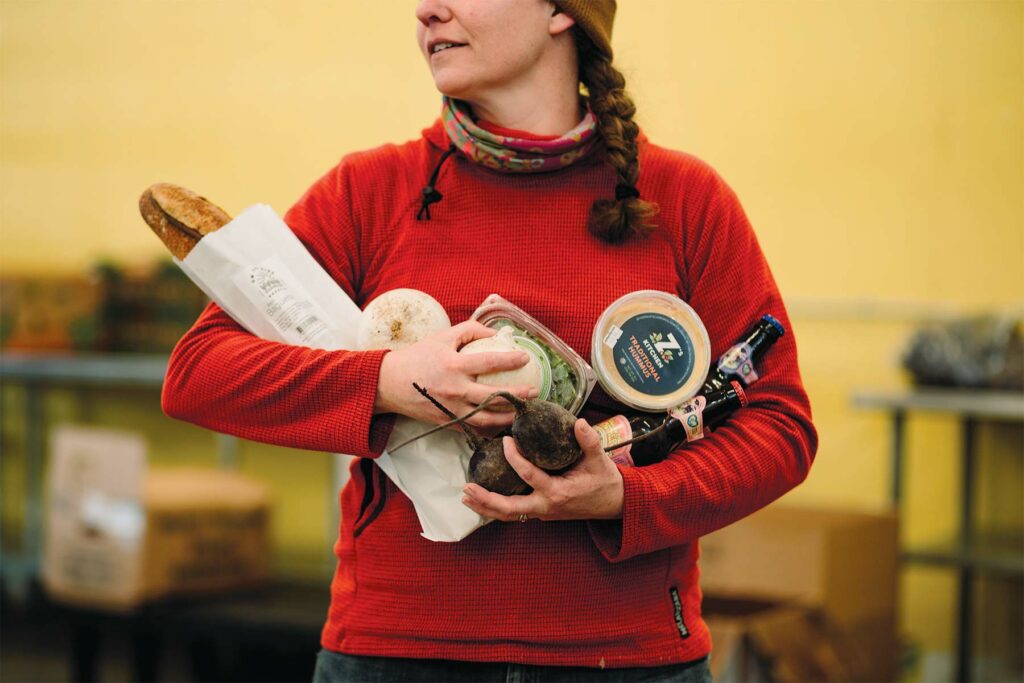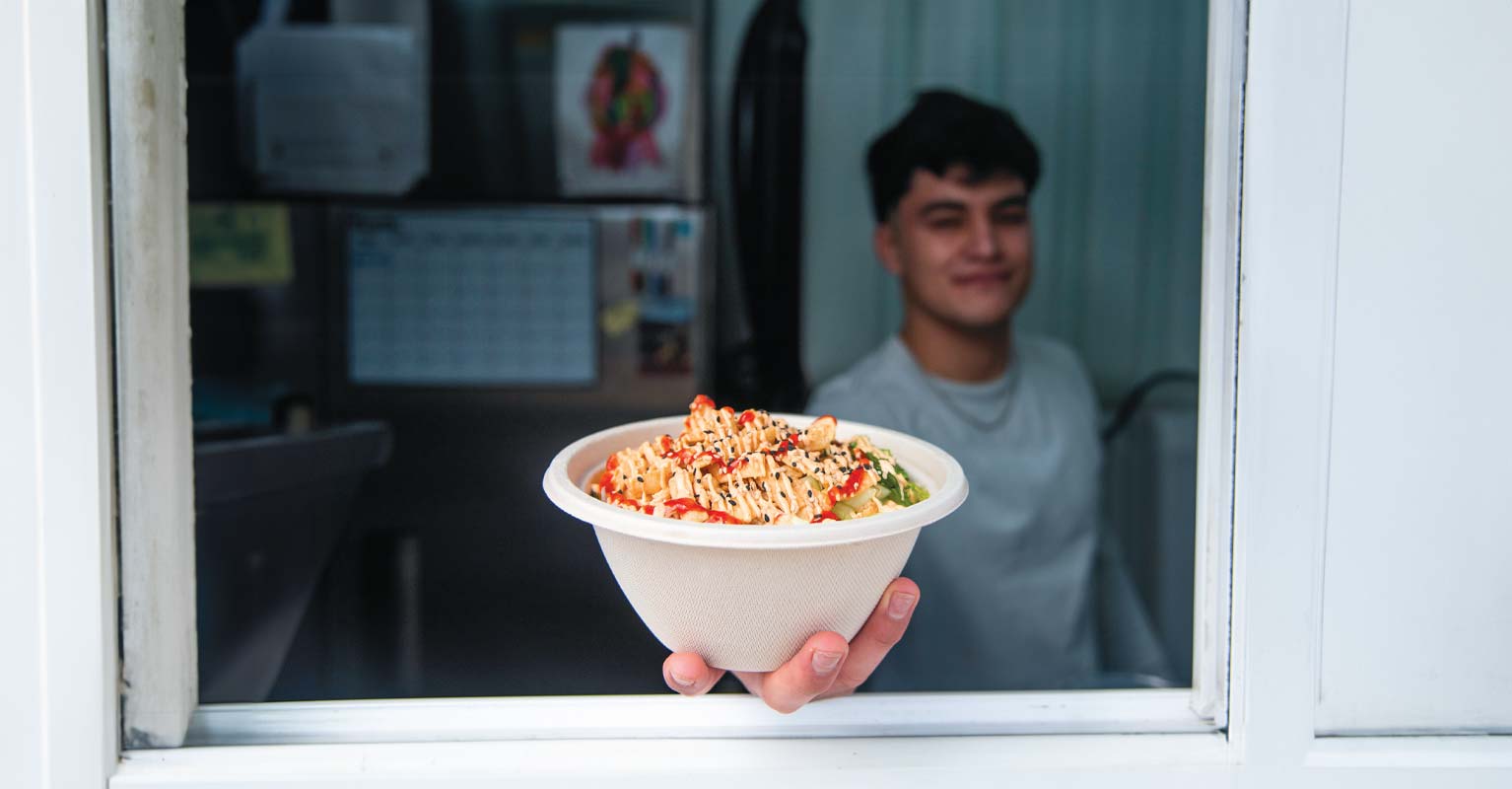Farm Cart Foods Connects Bozeman to Field, Farmer, and Food
On a Wednesday afternoon last summer, I pile into the passenger seat of a white van next to Katie Plumb, founder of Farm Cart Foods. “I meant to tell you to bring layers,” Katie says over the van’s air conditioning. Though I’ve become accustomed to living without AC since moving to Montana, the cool air is a welcome reprieve from the heat on this 92-degree day.
Farm Cart offers subscription-based weekly food delivery from local farms to customers who’ve signed up online and live within a 10-mile radius of downtown Bozeman. I’m riding along with Katie on her Wednesday delivery route.
After nestling my coffee into a cup holder, I turn to survey the back of the van, where the seats have been removed to make room for the food we’re delivering, the reason for the blasting AC.
“Wait, so what do we have in the van this week?” I ask.
“We have fennel and rainbow carrots, which are both from Chance Farm—they’re big and beautiful and that’s what’s bursting out of the bag today.” There’s also ricotta cheese from Amaltheia Organic Dairy, bacon from Ranchland Packing Co. in Butte, slicing tomatoes from Harlequin Organic Produce in Arlee, and peaches from Forbidden Fruit Orchard in Paradise, Montana. Each Farm Cart bag includes information about where the items were produced as well as recipe suggestions for how to use them. This week’s delivery features a recipe for a peach and tomato salad and one for rigatoni with tomatoes, fennel, and bacon. Subscribers can head to the Farm Cart blog for additional recipes featuring the week’s ingredients.
As we weave in and out of various Bozeman neighborhoods, I pepper Katie with questions.
Having grown up in Bozeman near Four Corners, watching housing developments replace farms, Katie made it her mission when she moved back to Bozeman in 2014 to support those who are still here by increasing awareness of and access to the local food system.
“Being able to learn the names of the farms, the names of the people who are growing your food or making your food, that’s part of building a more resilient community,” Katie says. She cemented this commitment by founding Farm Cart Foods in 2019. When the pandemic hit, Farm Cart’s business accelerated quickly, with new sign-ups from customers attracted to the guarantee of good, fresh local food, the ease of auto-renewing delivery, the surprise of what will be in the bag each week, and ideas for new recipes to experiment with.
Every item Farm Cart sources is grown, raised, or crafted in Montana, shortening the supply chain from producer to consumer and supporting local food economies. Whereas the produce in a traditional CSA subscription all comes from a single farm, Farm Cart sources from multiple farms, which increases the variety of the deliveries and allows Katie to highlight even more producers across the state. As she crafts the recipes that accompany each week’s delivery, Katie considers what she delivered the prior week and what might still be in the fridge, all part of her ethos to minimize food waste and increase the chances that the food doesn’t just “sit in a drawer full of guilt.”

Food doesn’t just appear—it’s grown in a real field we can drive by and one we can directly support.
Our conversation shifts to the seasons. Operating year-round offers Katie time to get creative, featuring other producers in Montana who make food like salsas and jams when fresh-from-the-garden produce isn’t available during winter and early spring.
“Winter highlights the things you start to miss and how special they are … the variety [of what’s growing] isn’t there and it can’t be there, but there are special things about how our eating habits change to reflect the seasons.” Eventually, the days begin to lengthen and signs of spring return, the green-up and abundance in the field soon to be mirrored on the plate.
For Katie, driving her delivery route is both a way to connect with her customers and a way to stay connected to this place, from the mountains to the fields and everything in between—to the change that’s happening on the landscape, but also to what remains the same.
Like Katie, I spend a lot of time thinking about how we build connection to the places we call home. What does that look like in someplace like Bozeman that’s changing so rapidly, where issues of growth, housing, and affordability feel intractable and overwhelming? How can we—whether seasonal, new, or long-time residents—get involved in this community in tangible ways and give back to the places that give us so much?
It strikes me that Farm Cart is an invitation to do just that. By making the connection to field, farmer, and food, Farm Cart makes visible all that is still here. Food doesn’t just appear—it’s grown in a real field we can drive by and one we can directly support. To buy local food from Farm Cart is to invest in the open space, scenic views, wildlife, soil, air, and water that make this place special. Th e things that make me want to keep calling this place home.
Driving along the Bridgers on her way to drop me back at my house, Katie says, “I’ve lived other places that were beautiful and mountainous and had all these great things, but nothing ever felt as grounding as being home.”
Farm Cart allows Katie to give back to the place she grew up in, and in growing her business she extends the same invitation to all of us: to be more deeply rooted in this community, to ground ourselves in place by connecting us to the ground that grows our food.
Visit farmcartfoods.com to learn more about Farm Cart Foods and sign up for deliveries.




